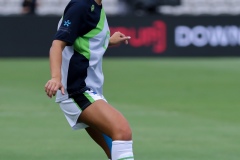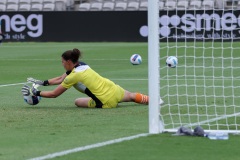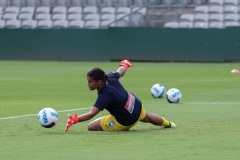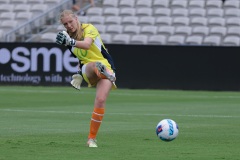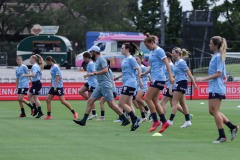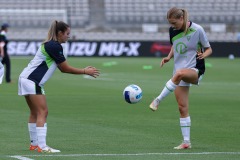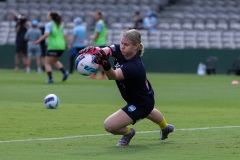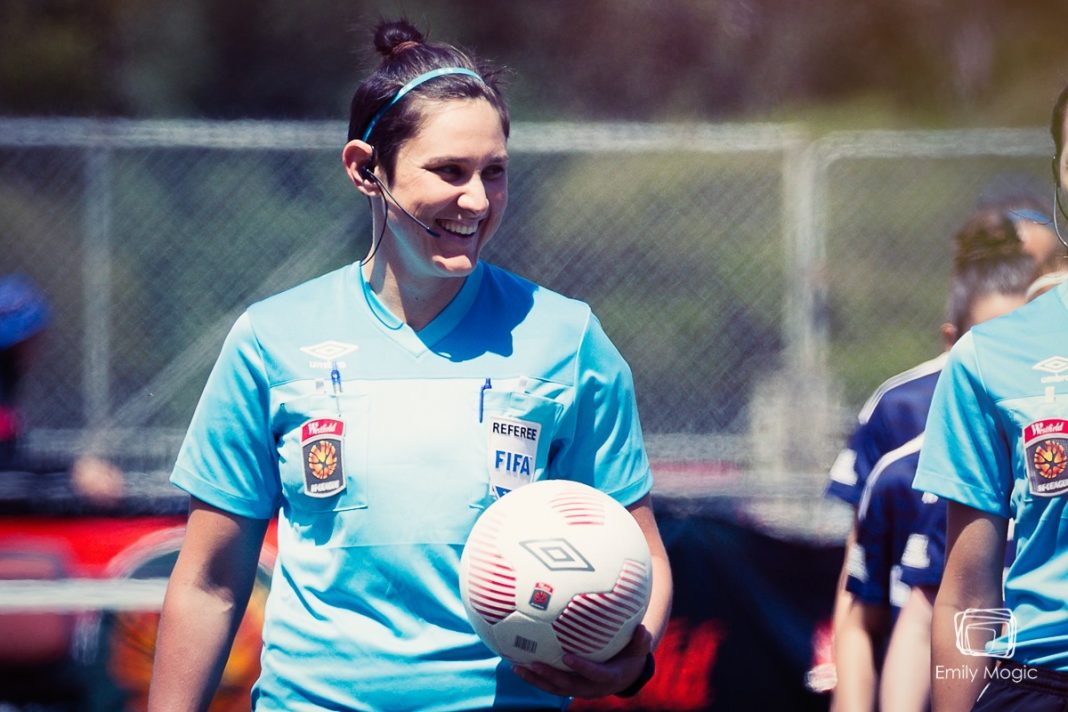

It’s been a whirlwind year for Kate Jacewicz on her journey to becoming arguably one of Australia’s most revered football referees. Throughout her tenure she’s broken barriers, challenged stereotypes and shattered ceilings, with each new accomplishment trumping the last.
Jacewicz reached the pinnacle of her career so far when she made her Women’s World Cup debut in France three months ago, but now she’s made history: becoming the first woman to be appointed as an A-League referee.
It comes as no surprise that the humble and self-effacing Melburnian is reluctant to accept the title of football’s female change-maker, preferring to simply be known as the A-League’s 43rd referee.
“I have only ever wanted to be recognised for my ability as a referee, that will never change.”
“To be appointed to the A-League panel is an achievement I’m proud of, which, I assume, would be the exact same feeling any other match official would have, regardless of gender.”
But she does acknowledge the significance of her appointment when it comes to being seen as a role model and inspiration for other girls and women wanting to follow in her footsteps.
“It was always going to be the hardest, being the first one to do something,” Jacewicz said.
“Having the pathway cleared by someone before you, certainly reduces the immediate obstacles you may face, but it doesn’t take away the hard work required to get to the top.
“It won’t turn all the noes into yesses but my biggest hope is that my appointment opens more doors and allows more females the opportunity to walk through them. I want girls and women to believe that anything is possible.”
Getting to the top has been a long road for the A-League’s newest referee, who throughout her career, accepted nothing less than “yes” to get to where she is today.
MAKING AN IMPACT
Jacewicz’s love of the beautiful game started at Mudgeeraba Soccer Club on the Gold Coast when she was eight years old. Initially, it was only playing she was interested in until she turned 13 and decided to try her hand at refereeing.
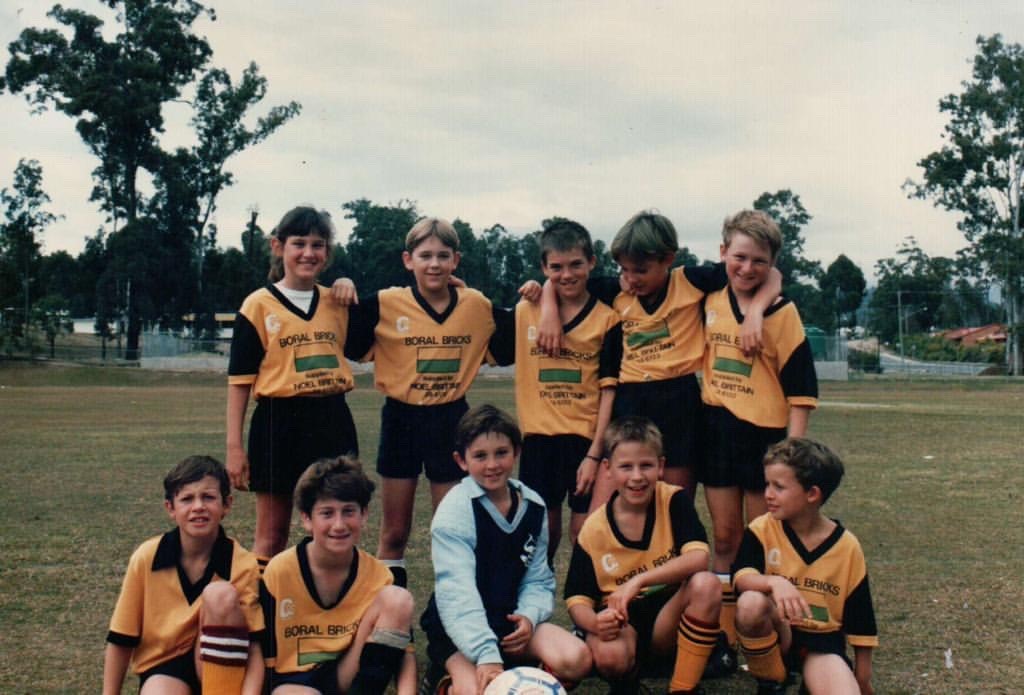
A football lover first and foremost, it was the potential to influence and create change that drew her to refereeing.
“I loved all aspects of football as a kid, but what drew me to refereeing was that you got the best of both worlds. You were part of a football game that you could essentially influence in a positive way. You were able to leave your legacy on that match, whether it was through your decision making or how involved you were in the game,” she said.
“As a referee, you get to experience the highs of the team who would score a goal, you hear the cheers of the parents and supporters and you share that feeling of elation. Equally so, you also feel the disappointment of a team who are doing it tough. You can feel their desperation trying to get a goal back or trying to equalise.
“You experience all those emotions and to live it firsthand, as a referee, it’s just amazing being able to take part in those special moments that sport create.”
Climbing through the ranks, Jacewicz’s determination to leave her mark secured her gigs at state and national titles. Although still a teenager, she was refereeing senior men’s football between the ages of 17-20.
She officiated at the Youth Olympic Games before being named a referee of the inaugural W-League season in 2008 and earned herself W-League Referee of the Year eight times over the course of the competition’s 11 seasons.
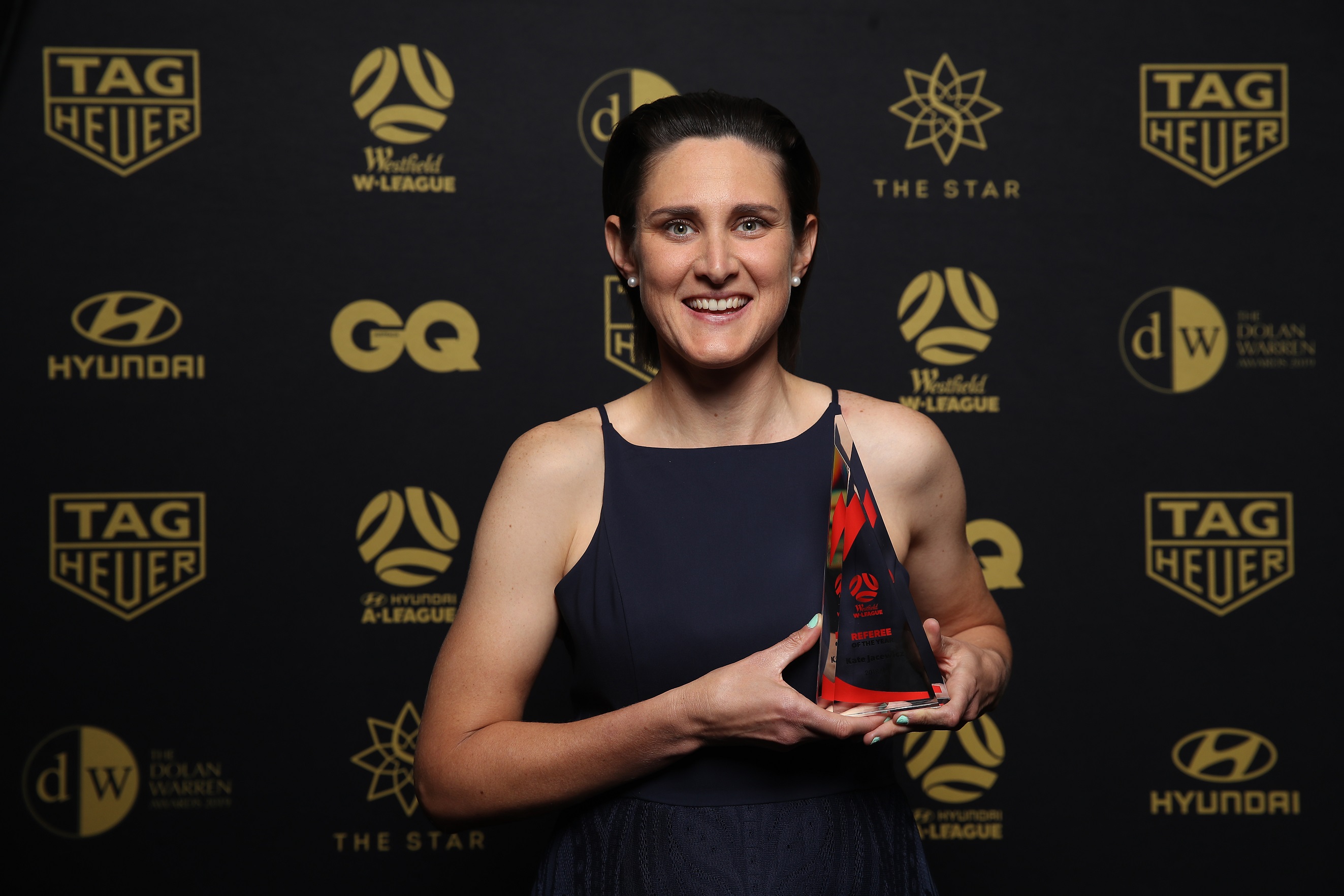

In 2011, Jacewicz finally received her FIFA badge, which she referred to as “the holy grail,” which opened up a whole new world of international competition along with high-level development and gratitude-inspiring experiences.
“Sometimes I have to pinch myself, when I think about the places football has taken me. It has opened up a whole new world I would never have dreamed of and I’m just so lucky to have these experiences,” she said.
“No matter where in the world you go, everyone has this common love for the game. The emotional highs and lows are so universal, whether it be from a glorious play or a heartbreaking loss, everything that football creates is so unique and to be part of it and live it all over the world is just incredible.”
At the end of 2015, Jacewicz was nominated for the 2019 FIFA Women’s World Cup as one of 10 referees from the AFC. She went to countless seminars and refereed around the world to increase her chances of going to France.
Cuts were made at the end of 2016, 2017 and 2018 and in December 2018, she received the call she had been waiting for.
“My boss called me to tell me one of two things… You’re on, or you’re not on. Luckily, he said I was on and I was just speechless.”
THE 2019 FIFA WOMEN’S WORLD CUP
It was at a sold-out Parc Des Princes in Paris, France, where a roaring crowd electrified the stands. The current surged onto the pitch and ignited the senses of the referees as they walked across the field, about to take part in one of the most anticipated match-ups of the World Cup.
Jacewicz’s inner 13-year-old was hardly able to believe where she was standing. After two decades of hard work and sacrifice, the now 34-year-old was representing her country on the biggest stage of them all.
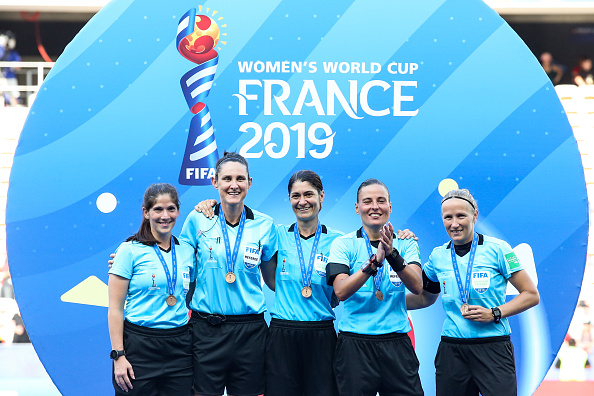

Jacewicz made her World Cup debut during the group stages of the 2019 FIFA Women’s World Cup, when Norway took on Nigeria.
“The first match was a bit of a blur. I was running on this high, anxious energy. It was my first World Cup match and it felt so familiar, but so very different. I mean, this was on another level. I was participating in a World Cup, something I’d never done before,” she said.
“I just felt such relief after that final whistle, everything went to plan, it was a great match and was probably the best performance I’d ever had. It was the first time myself and my assistant referees had worked together so it was a very special moment for all of us and we all shared that relief and excitement.”
Jacewicz was fourth official in a group stage match between Canada and New Zealand, and referee for a Round of 16 match between Sweden and Canada. She was again named fourth official in the third place play-off between England and Sweden and in the quarterfinal between France and the US – a match she recalls as her most memorable of the tournament.
Home-side France were about to take on three-time World Cup champions and international football juggernauts the US Women’s National Team, in front of 45,595 screaming fans.
“The match between France and the US was pretty much anticipated to be the final and it was just such a high-energy game. There was so much tension in the stadium, from the players, to the coaches to the crowd,” Jacewicz said.
“Just being able to be part of the referee team and trying to manage all of those emotions as well as the game was pretty spectacular.”
One of the talking points of the 2019 FIFA Women’s World Cup was the introduction of VAR. For all the controversy and chatter it attracted, Jacewicz said it was just another day in the office for her.
“It was still a referee match, except now you had a man in your ear, as well as the on-field team,” she said.
“Having a VAR review wasn’t anything out of the ordinary for me, we were prepared. FIFA had trained us exceptionally well, so I felt no pressure and no nervousness around VAR, especially with my reviews.”
And her cool, calm and collected approach garnered much support from spectators and players alike.
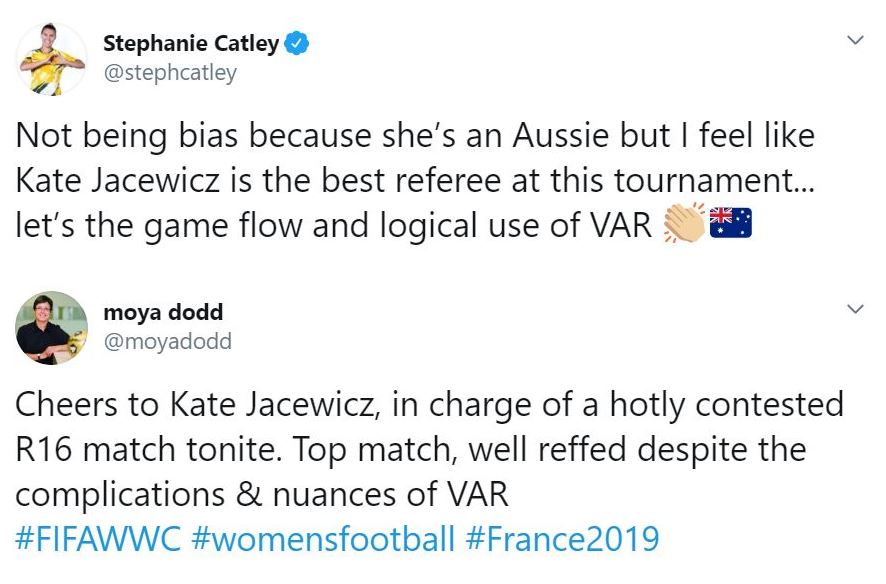

“That’s what you go out there for, to ensure that the players are safe, feel like they’re being treated fairly and to keep the game balanced.
“It’s such a juggling act to referee as well as trying to be human. The players have a job to do but they also want to enjoy themselves, so to hear that is really, really nice,” she continued.
“Receiving that public support from players or high-profile people helps, because hopefully they can change or have some influence on the general public’s negativity towards referees.”
CRITICISM, MISOGYNY & THE VILLAIN COMPLEX
Whether it be right or wrong, referees from all sporting codes have come to accept that copping criticism is just part of the job, but being a woman attracts an added level of bigotry and misogyny.
“If you walked off every game thinking you’d done an excellent job, no one would be holding you accountable,” Jacewicz said.
“Self-reflection is a powerful tool and there are times where it needs to be aided by someone saying, ‘Hey ref, you did something wrong here which led to this’ and I’m very open to that, but I’ve had sexist comments thrown at me and I’ve had derogatory words thrown at me throughout my career,” she shared.
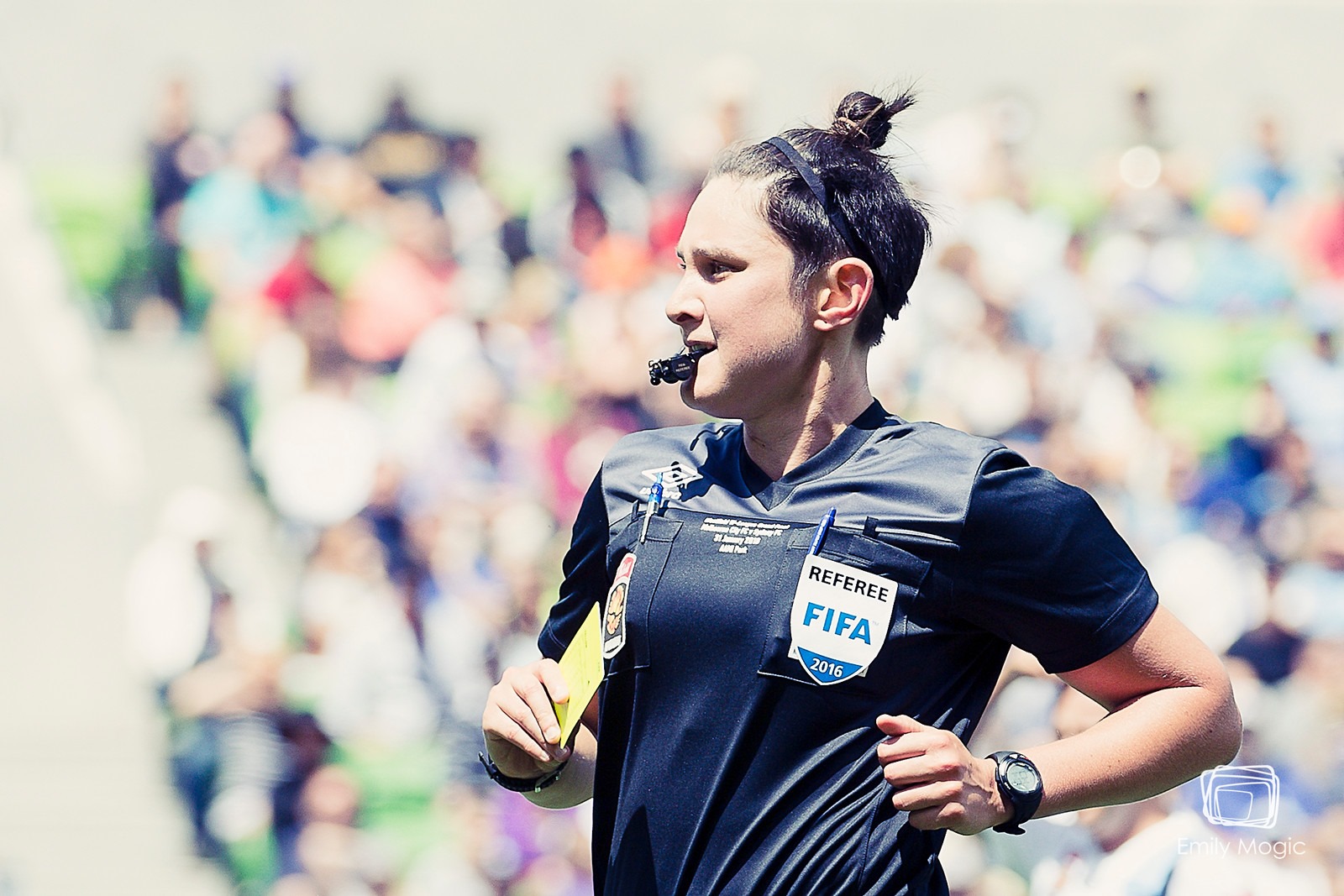

“And these people have never walked a minute in the shoes of a referee, nor would they know the first thing about the laws. They look at me as a young female, which they interpret as me not having the same experience as them, being a spectator of 20 years, where in fact, I am more than likely a lot more qualified.
“It’s never rattled me in a sense that I’ve ever wanted to quit or walk away, but it certainly does affect you. Your mood after the match and your enjoyment levels are significantly decreased, you just walk away feeling horrible and you do start to question yourself. As much as you try to limit the external validation you get from supporters you do ask yourself ‘Did I do a good enough job, where has this all come from?’ and that self-doubt does start to creep in.”
But after more than two decades of refereeing and playing football, Jacewicz is confident in the face of uneducated criticism and lazy misogyny.
“At the end of the day, my experience comes in to play and I can acknowledge that I am a little bit more qualified than those in the stands,” she said.
“I’m trained to know the laws and to interpret the laws and I understand my role and responsibilities as a referee. That gives me the confidence to be able to disregard the comments that fly in from the sidelines, as ones just said in the heat of the moment by ignorant people that lack the understanding of the laws and their interpretation. They’re the people who don’t know what sport is actually about.
“A lot of people see referees as the villain, which is hard. But that’s the competitive nature of football and sometimes you need to take a step back and see the bigger picture.
“We are all still human and we can’t lose our humanity. We can’t dehumanise players or referees because this game is what has brought us together, football unites people.”
“Comments that are sexist or derogatory just show the lack of care, knowledge and understanding those people have for the game. If calling me names is the best they can come up with, it shows how little they actually know, as they can’t form an educated argument.”
SACRIFICES FOR THE GOOD OF THE GAME
What a lot of spectators tend to forget is that the majority of the time, these men and women have sacrificed their own playing careers or beloved hobbies to give back to the game in a different way. Jacewicz is no exception.
“When you start refereeing at a high level, you can’t play anymore,” she said.
“I was meant to stop playing in my late teens, but just couldn’t bring myself to, so I kept playing until my early 20’s, which is when the W-League started.
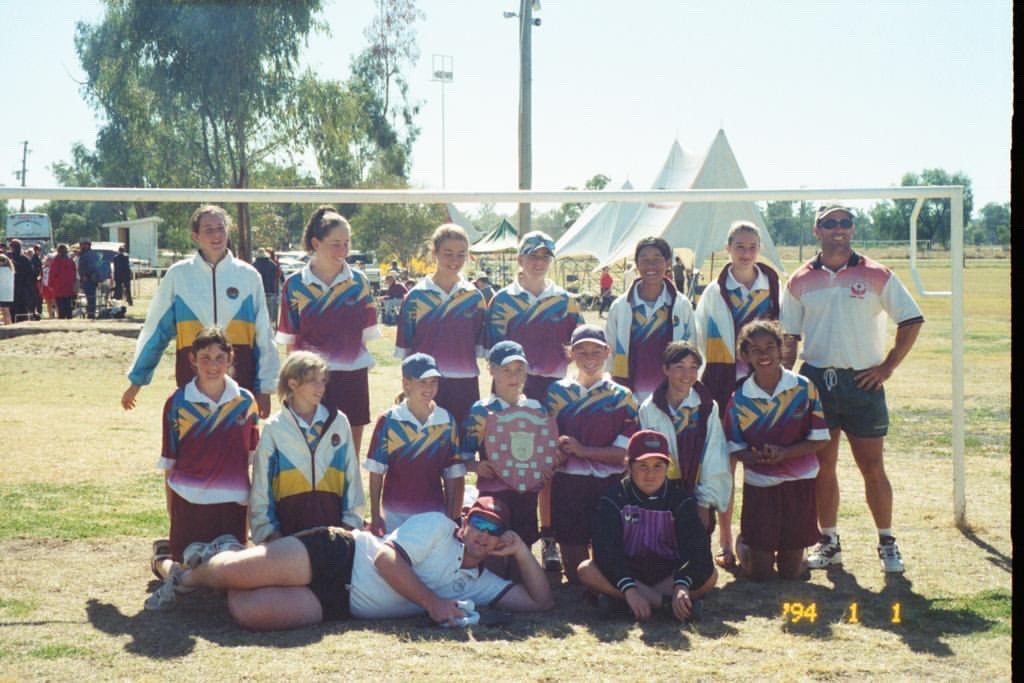

“I got into the W-League which was amazing and I may have played some sneaky state league games in Victoria in the beginning, but having to give up the playing completely was heartbreaking because it’s something you love so passionately.
“I played for longer than I’ve refereed and I’ve refereed for 22 years. Having to give it up so young, you really notice the impact of that decision and you wouldn’t do it unless you were pursuing something meaningful.”
Jacewicz has refereed nine W-League grand finals, the most of any W-League referee. She says that her success at both a domestic and international level has definitely softened the blow of sacrificing her playing career.
“In a way I’ve been lucky, having success at such a high level has masked how hard it was for me to give up playing, but in the end, for me, it was the realistic question of, am I more likely to play for the Matildas at a World Cup, or referee at a World Cup?”
THE MATILDAS
It’s inevitable that growing up playing football at an elite level, friendships would develop which may make it hard to maintain neutrality on the pitch. Jacewicz has played both with, against and refereed many of the Matildas and W-League players, but says that when it’s game time, all bets are off.
“It’s funny because before a match we can have a laugh and a joke. I’ve played with some of the W-League and Matildas players and I’ve known them for quite a long time,” she explained.
“Off the field, we can have a laugh and a chat but on the field there’s a switch that just flicks.
“Sam Kerr, for example, will always come up and have a chat with you before and after the match. I’ve seen her at awards nights and we always have a little catch up, but on the field she is the fiercest competitor.
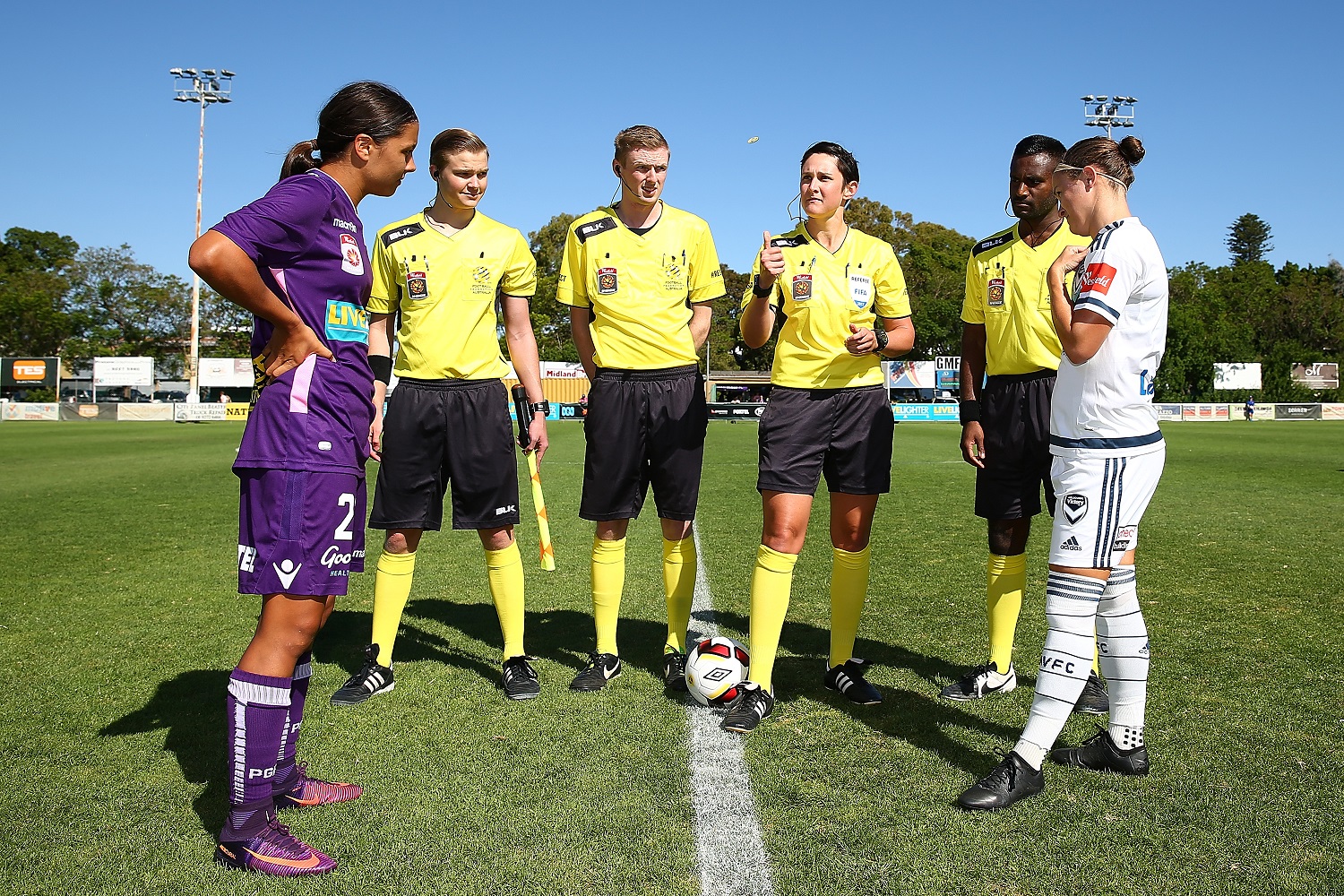

“I’ve never actually seen someone switch like Sam can, she can be quite fierce but there’s still that respect and she’ll never cross a line. That goes for all players I’ve got a relationship with off the field. There’s always that level of respect and a line they never cross.”
THE DEVELOPMENT OF FEMALE REFEREES
Seeing the success of someone like Jacewicz is imperative to the growth and investment of female referees. For so long, across all sports and codes, refereeing was considered more of a man’s job. Perhaps not intentionally, but the pathways and investment for women historically just hadn’t been there.
“At a national level, especially now with the W-League, there is a tangible pathway for female referees,” Jacewicz said.
“The W-League now acts as a development pathway which can lead to international recognition such as receiving a FIFA badge which can then lead on to refereeing at something like a World Cup.
“At a grassroots level, it’s a little bit tougher and quite hit and miss,” she shared.
“We definitely still have some work to do in that space and throughout my experience I have noticed a disconnect between referee development at a national and elite level, compared to a community football or state level.
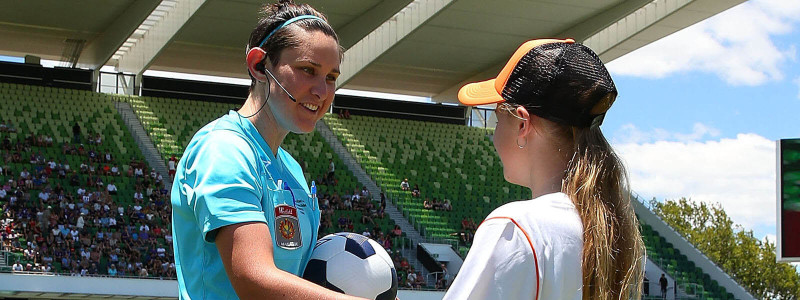

“The state system can be challenging, because there is a lack of resources and support which isn’t conducive to the development or the retaining of female referees.”
One example Jacewicz gave of the barriers she faced at a state level was when she was in her final stages of preparation before the World Cup, but was unable to find suitable matches unless she travelled interstate.
“The expectation from FIFA was that I needed to referee the highest level men’s matches I could, in preparation for the World Cup,” Jacewicz explained.
“But the only way I could do this was to pay my own way and travel to South Australia as there were no opportunities offered closer to home.
“Football SA were very accommodating, they appointed me to their men’s NPL competition, and I was able to complete what FIFA had requested of me, which ultimately led to me being selected to referee at the World Cup.”
But fighting through these barriers and coming out the other side as one of Australia’s most successful referees now sets Jacewicz up as a role model for other girls and women who may have thought refereeing at an elite level was not a viable option.
“How do you teach resilience? because that’s what it is.”
“For me, the love of football was what kept me going, that’s what helped me fight through so many barriers.
“Be confident in yourself and in your decision making and never stop learning because knowledge is what builds confidence.
“No matter what barriers are in front of you or what abuse is being thrown at you, having the knowledge that you’re doing the right thing, having that internal validation is the most important part of being a referee.
“Back yourself, ask questions and never stop educating yourself because your knowledge is your armour.”


